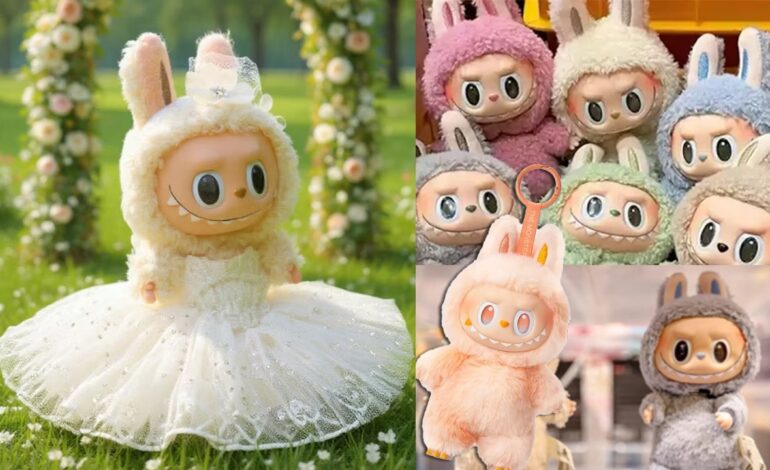Labubu Craze Expands: From Bridal Gowns to Blockchain Collectibles

The toy phenomenon surrounding Labubu, a plush figure created by Pop Mart, has taken a surprising turn. David’s Bridal, a retailer with a 70-year history in wedding attire, has announced it will create custom dresses for Labubu dolls. This move reflects the growing cultural significance of Labubu, which has become a sensation in the toy market, generating over $1 billion in sales.
The Labubu craze goes beyond just plush toys. Collectors in cities like Los Angeles are engaging in a form of “drop culture,” hunting for Labubu dolls in Pop Mart-branded vending machines located in shopping centers such as Westfield Century City and Glendale Galleria. These collectors often miss out on their desired toys, leading to inflated prices at nearby gift shops.
Digital platforms have also played a key role in the Labubu phenomenon. Pop Mart hosts live streams on TikTok, where fans compete to purchase limited-edition blind boxes. These streams have become a popular event for younger audiences, resembling shopping channels like QVC but tailored for the digital age. Fast fingers are required; those who comment “bubu plz” quickly may secure a toy before automated bots deplete the stock.
In addition to physical toys, Labubu has made its mark in the cryptocurrency realm. The existence of a LABUBU token on exchanges like MEXC allows fans to trade digital currency for the plushie, although its primary function is to serve as a collector’s item and provide promotional codes during special events.
Customization has become a significant aspect of the Labubu culture. Etsy sellers are producing a variety of accessories, including jerseys and miniature hats, while TikTok users showcase their creative skills by customizing figures with colorful designs. Instagram artists are also offering repaint services, allowing customers to request unique designs, such as goth-style Labubus adorned with Swarovski crystals.
As the popularity of Labubu grows, so do concerns over counterfeit products. Reports from trading standards in the U.K. reveal that authorities have seized thousands of fake dolls, some made with hazardous materials. Many consumers in the U.S. have fallen victim to scams, purchasing from unreliable online sources and receiving nothing or low-quality imitations.
Resellers have also entered the market, using automated tools to buy up stock quickly and then relist these dolls on platforms like eBay at steep markups. Potential buyers are advised to look for Pop Mart’s hologram QR code to verify authenticity and avoid counterfeit items, often referred to as “Lafufu.”
Interestingly, while Pop Mart itself continues to operate using traditional currency, secondary marketplaces are embracing cryptocurrency, with communities on platforms like Discord facilitating trades using Ethereum. Notable auctions, such as Pharrell’s Joopiter, have even accepted Bitcoin for exclusive items, further integrating Labubu into the luxury collectibles market.
The Labubu phenomenon exemplifies a unique blend of culture, commerce, and technology, transforming from a simple toy into a coveted asset class. Whether collectors are bidding significant sums for life-size Labubu figures or participating in live shopping events, the allure of this figure continues to capture the imagination of fans. As the craze evolves, Labubu stands as a testament to the intersection of traditional retail and modern digital trends.






